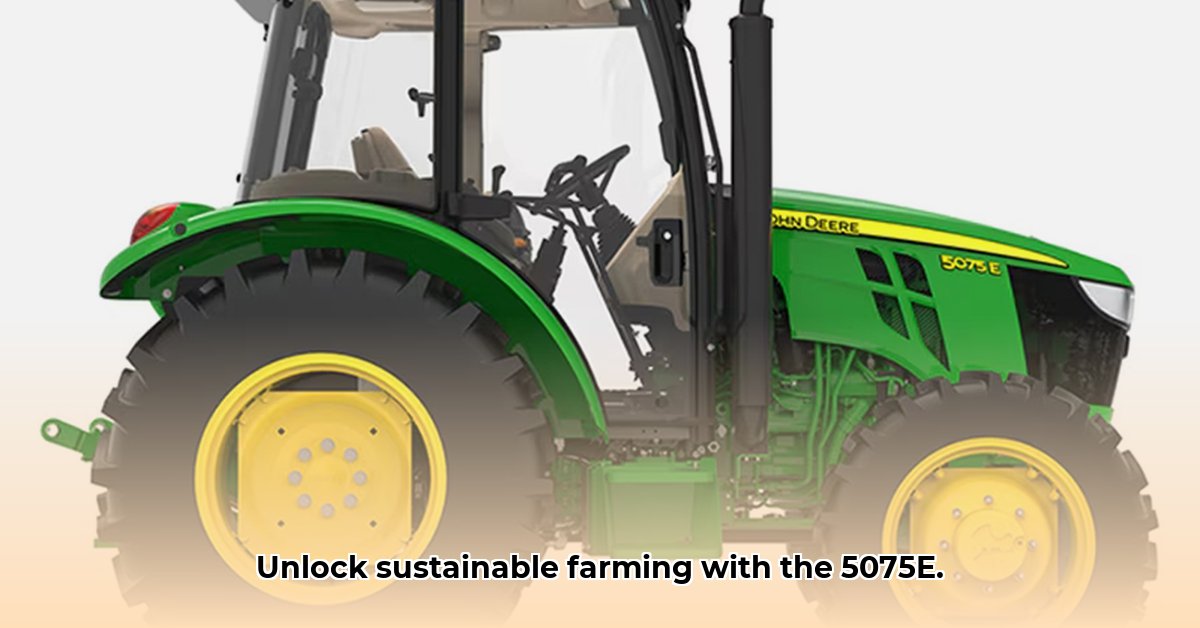
John Deere 5075E: A Deep Dive into Sustainable Farming
The John Deere 5075E tractor represents a significant advancement in sustainable agricultural practices. This comprehensive guide analyzes its contributions to environmental responsibility and farm efficiency, examining its key features, fuel economy, operator comfort, and the crucial role of lifecycle assessments (LCAs) in sustainable agriculture. We'll also explore actionable steps for farmers and other stakeholders to maximize the 5075E's sustainability potential. For more images and details, check out this tractor with trailer.
Technical Specifications and Sustainable Features
The John Deere 5075E boasts several features designed to enhance sustainability. Its PowerTech™ engine, for instance, offers significant fuel efficiency improvements over previous generations. This translates to lower operational costs and a reduced carbon footprint. The absence of Diesel Exhaust Fluid (DEF) and Diesel Particulate Filter (DPF) simplifies maintenance, reducing downtime and associated emissions. The Electronic Quick Raise-Lower (EQRL) hitch system streamlines implement changes, boosting operational efficiency. Improved visibility through LED lighting and a rear wiper minimizes accidents and improves overall productivity.
Fuel Efficiency: Minimizing Environmental Impact
How much fuel does the John Deere 5075E really save? While precise figures depend on factors like terrain and workload, independent testing and user reports consistently highlight considerable fuel savings compared to older models. This directly reduces greenhouse gas emissions and operational expenses. Isn't that a compelling reason to consider upgrading to a 5075E?
Operational Efficiency: Maximizing Output
The 5075E's EQRL system significantly reduces implement changeover time. This feature, combined with improved visibility, allows farmers to accomplish more in less time. Improved efficiency translates directly to reduced fuel consumption per acre worked, contributing to both economic and environmental sustainability.
Sustainability Analysis: A Multifaceted Approach
Sustainable agriculture encompasses more than just fuel efficiency. The 5075E also promotes operator well-being through features like an air-suspension seat and user-friendly controls. Reduced operator fatigue leads to increased productivity and fewer errors, ultimately enhancing the farm's overall sustainability.
Limitations and Further Research
While the 5075E showcases significant improvements in sustainability, comprehensive Lifecycle Assessment (LCA) data remains limited. Further research is needed to fully quantify its environmental footprint across its entire life cycle. Furthermore, the choice of implements significantly impacts the overall sustainability of the farming operation.
Lifecycle Assessment (LCA): Understanding the Complete Picture
An LCA provides a holistic view of a product's environmental impact, encompassing material sourcing, manufacturing, operation, maintenance, and disposal. Conducting a thorough LCA for agricultural machinery like the 5075E is complex, requiring detailed data across its entire lifespan. However, the growing emphasis on LCA underlines the need for more comprehensive data regarding tractors.
Actionable Recommendations: A Collaborative Approach
Sustainable agriculture requires a collaborative effort. Here's a breakdown of actionable recommendations for key stakeholders:
- Farmers: Implement precision farming techniques; adopt no-till or conservation tillage; explore sustainable fuel alternatives.
- Dealers: Provide training on fuel-efficient operation and maintenance; promote sustainable farming practices.
- John Deere: Publish transparent LCA data; invest in sustainable technology research.
- Researchers: Conduct comparative studies; refine LCA methodologies for agricultural machinery.
- Policy Makers: Offer incentives for eco-friendly equipment and practices; support sustainable agriculture regulations.
Conclusion: Towards a Greener Future
The John Deere 5075E represents a step towards sustainable agriculture. Its fuel efficiency, enhanced operational capabilities, and operator comfort contribute to both environmental protection and increased farm profitability. While comprehensive LCA data is still emerging, the 5075E showcases the potential of technology to enhance sustainability in farming. Continued collaboration and research are crucial for further advancing sustainable agricultural practices.